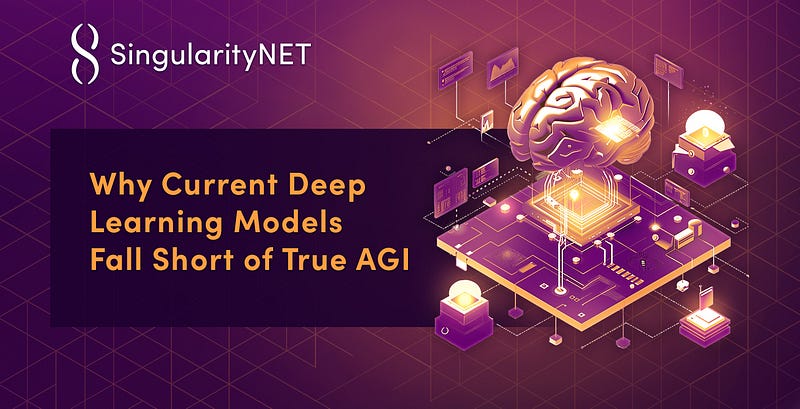
Dear Singularitarians,
Its safe to say that deep learning has revolutionized the field of artificial intelligence (AI) in the last few decades. However, deep learning remains fundamentally limited in its capacity to help humanity achieve artificial general intelligence (AGI). Despite its impressive advancements in generating coherent responses in text, realistic images, videos, and even accurate predictions, these models fall short in several important areas that are vital to the nature of AGI.
The current deep neural networks and machine learning algorithms that dominate AI research are not designed to replicate human-level intelligence or the generality that AGI needs. Lets explore why this is the case; and discuss some of the limitations that make deep learning simply insufficient in the development of true AGI.
One of the most significant criticisms of deep learning is its inability to generalize effectively. This limitation has very meaningful implications that speak to the foundational nature of AGI, and this is particularly the case in edge cases where the model encounters scenarios not covered in its training data.
The autonomous vehicle industry provides a stark example, having invested over $100 billion in deep learning only to find that these models struggle with novel situations. The June 2022 crash of a Cruise Robotaxi, which encountered an unfamiliar situation, underscores this limitation.
Most deep learning models are usually designed to achieve a specific task. Speaking back to generalization, these models excel in narrow domains where they can be trained on large amounts of data relevant to a particular problem, such as image recognition, language translation, or even playing a specific game.
AGI, on the other hand, requires the ability to understand, learn, and apply knowledge across a wide range of tasks and domains, similar to human intelligence.
Not to mention, these models require an enormous amount of data to learn effectively. They naturally struggle with tasks where labeled data is scarce or where they have to generalize from a set of limited examples. AGI would need to learn and adapt not only with much less data, but also with the ability to draw conclusions from sparse and diverse experiences.
At the heart of deep learning is the ability to recognize patterns within large datasets and generate outputs based on these patterns. This method, akin to sophisticated curve fitting, allows models to produce coherent text and video content.
However, these models do not possess genuine understanding or reasoning abilities.
They do not comprehend the content they generate in any real way; they simply mimic the patterns they have been trained on.
For instance, while models like GPT-4 can generate an essay on quantum mechanics, they do not understand the underlying principles. Similarly, they can create visually coherent videos that might defy the laws of physics because their primary goal is to maintain visual consistency rather than factual accuracy. This fundamental gap between pattern recognition and true understanding speaks to the limitations of some of the current, prevalent AI models.
These models simply struggle with tasks requiring reliable reasoning. They can generate impressive outputs, but they often fail when it comes to understanding basic principles or performing tasks that require abstract thought. This limitation is a significant barrier to achieving AGI, which requires a model to not only generate content but also to understand and reason about it in a human-like manner.
Human intelligence is characterized by the ability to set goals, make plans, and take initiative. Current AI models do not possess these capabilities. They operate within the confines of their programming and the specific tasks they have been trained to perform. This lack of autonomy and initiative is another fundamental shortcoming that prevents these models from achieving true AGI.
Unlike humans, who continuously learn and adapt throughout their lives, AI models are generally static once trained. They lack the ability to autonomously learn new information or adapt to new contexts without human intervention. This static nature is a massive hindrance to achieving AGI as it requires continuous, autonomous learning.
Humans engage with the world by perceiving it in real-time, relying on existing representations and modifying them as necessary for effective decision-making.
In contrast, deep learning models must create exhaustive rules for real-world occurrences, which is impractical and inefficient.
For example, when encountering a cylindrical object on a trail, a human would assess and update information continuously, making robust decisions based on past experiences.
Achieving AGI requires moving from predictive deductions to enhancing an inductive what if capacity.
While its true that deep learning has achieved remarkable advancements in AI, it falls short of the requirements for AGI.
The limitations in understanding, reasoning, continuous learning, and autonomy highlight the need for new paradigms in AI research.
By exploring alternative approaches, such as hybrid neural-symbolic systems, large-scale brain simulations, and artificial chemistry simulations, we can move closer to achieving true AGI.
Its going to be a complex, multifaceted journey that will require breakthroughs not just in AI models achieving AGI would likely require advancements beyond current deep learning approaches, possibly involving new paradigms of learning, reasoning, and understanding.
SingularityNET was founded by Dr. Ben Goertzel with the mission of creating a decentralized, democratic, inclusive, and beneficial Artificial General Intelligence (AGI). An AGI is not dependent on any central entity, is open to anyone, and is not restricted to the narrow goals of a single corporation or even a single country. The SingularityNET team includes seasoned engineers, scientists, researchers, entrepreneurs, and marketers. Our core platform and AI teams are further complemented by specialized teams devoted to application areas such as finance, robotics, biomedical AI, media, arts, and entertainment.
Decentralized AI Platform | OpenCog Hyperon | Ecosystem | ASI Alliance